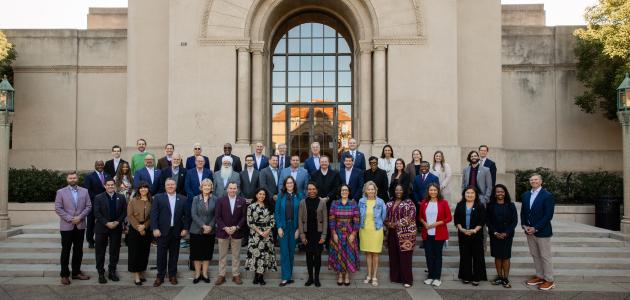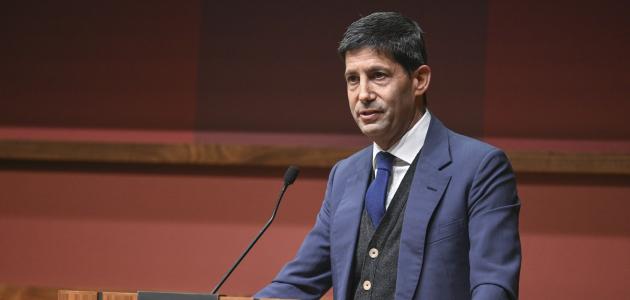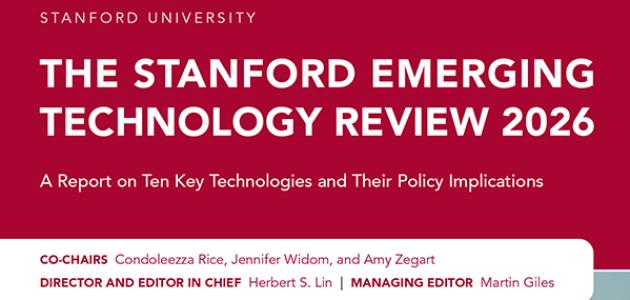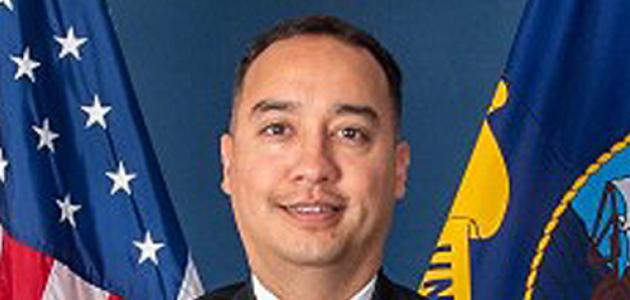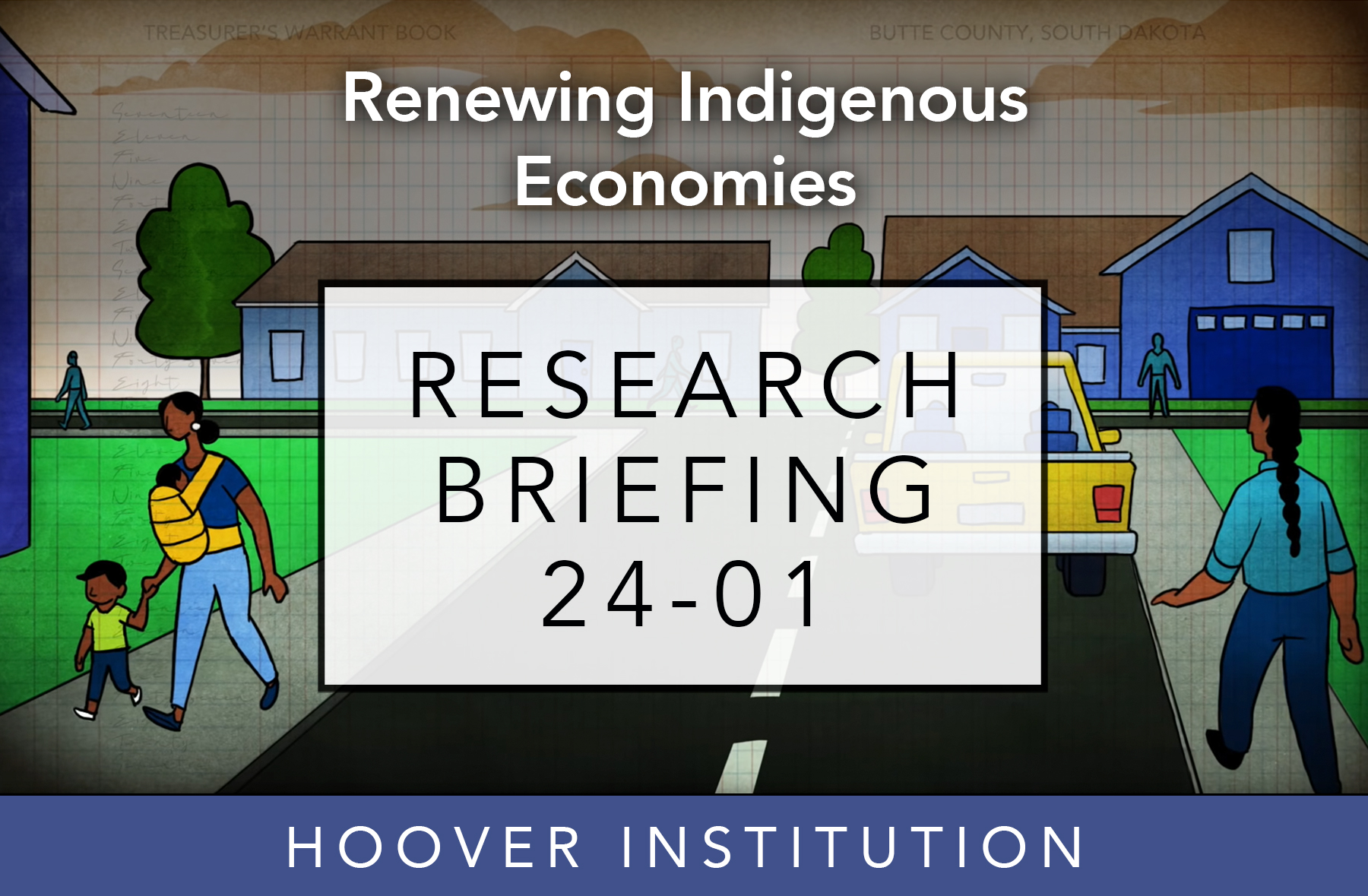
T H E R I E R E P O R T | J U N E 2 0 2 4
Note from the Project Directors Terry Anderson & Dominic Parker
The Hoover Project on Renewing Indigenous Economies (RIE) continues to work toward finding new ways to support economic regrowth in Indigenous communities consistent with respecting their cultures. This Q1 2024 RIE Report updates the progress of the RIE project and shares resources that tribal leaders, scholars, and policymakers can use to rebuild prosperity among Indigenous people. We welcome your input, so please stay in touch at indigenousecon@stanford.edu.
R E C E N T E V E N T S
Workshop on the Political Economy of Native American Policy
The RIE project cosponsored a workshop hosted by Jeffery Jenkins of the Price School of Public Policy at the University of Southern California, on March 5, 2024. The workshop gathered 20 scholars in political science, economics, and law to discuss six research papers with topics including tribal water rights, child welfare, and assimilation. Project codirectors Terry Anderson and Dominic Parker summarized key findings from the Hoover project and invited scholars to join its efforts. Click for workshop agenda.
38th Annual Coming Together of Peoples Conference
RIE scholars Adam Crepelle and Dominic Parker presented to an audience of more than 150 lawyers, law students, tribal leaders, professors, and federal agency personnel at the University of Wisconsin’s 38th annual conference on Indigenous law, held April 12–13. Crepelle and Parker joined a panel focused on tribal legal codes and courts. They emphasized how private-sector investment depends on a transparent and stable rule of law and gave examples of how tribes are providing this stability.
Native American Mining and Energy Sovereignty Symposium
Dominic Parker gave a keynote address at a public symposium held at the Southern Ute Indian Reservation focused on mining and energy sovereignty. The May 20–21 event hosted 160 attendees representing tribes, private industry, federal agencies, and academia. It was organized by the Payne Institute for Public Policy at the Colorado School of Mines and RIE contributor Daniel Cardenas of the National Tribal Energy Association. The symposium featured sessions on past challenges and future opportunities in mining, oil and gas development, and renewable energy. Experts discussed regulatory processes, permitting, and community involvement necessary for tribes to benefit from energy transitions. Parker summarized the RIE project, highlighting research on natural resource and energy policy while inviting participants to utilize RIE project readings, videos, and forums.
I N F I L M
Terry Anderson reflects on Ken Burns’s recent PBS documentary The American Buffalo in his essay “Buffalo and the Rational Hunters.” He writes, “Ken Burns’s story of the American buffalo has much to say about the stripping of dignity of self-sufficiency as buffalo were hunted to near extinction and hunters were allowed, and at times encouraged, to violate tribal rights to territories. However, this story of demise fails to capture why tribes thrived and could thrive again.” The RIE project documents that tribes reliant on the buffalo thrived because their governance structures managed buffalo hunting and provided incentives for rational use of buffalo resources. Click to read the essay.
Native American institutions and their suppression by federal policies are also featured in the one-woman theatrical play On the Far End, written and performed by Mary Kathryn Nagle, an attorney whose work focuses on tribal sovereignty. The title references a phrase in the the landmark 2020 Supreme Court opinion in McGirt v. Oklahoma, which upheld the sovereignty of Oklahoma tribes as described in RIE scholar Robert Miller’s book A Promise Kept (coauthored Robbie Ethridge). The play traces Muscogee leader Ella Jean Chaudhuri’s family history: the Trail of Tears, her grandfather’s allotment in central Oklahoma, the Indian boarding school she fled on foot, and the advocacy for self-determination that won her an award before the US Supreme Court in 1977. Click to read about the play.
Haley Rains, a participant in Hoover’s 2023 Indigenous Student Seminar, was awarded the University of California President’s and Andrew W. Mellon Foundation Postdoctoral Fellowship. She will work on her documentary We Are Not Your Savages in the Film and Digital Media Department at UC Santa Cruz. Haley will also speak at the 2024 Indigenous Student Seminar.
R E A D I N G R E C O M M E N D A T I O N S
One Hundred Years after the Indian Citizenship Act
In their Hoover Digest essay “Dependent No More,” Terry Anderson and Dominic Parker note that it has been 100 years since the United States granted citizenship to all American Indians and ask if it someone can be both a free citizen and a ward of the state. Providing historical and contemporary examples, they argue that the “federal guardian role too often limits the benefits of both tribal citizenship and US citizenship.” Turning to the challenges of successfully wielding tribal governance, they highlight the double-edged sword of sovereignty, stating, “Ultimately, citizenship is only as useful as the rules that govern citizens.” Click here to read the essay.
Economic Freedom and Income Growth
In his research briefing “Economic Freedom on American Indian Reservations Corresponds with Higher Incomes,” economist Thomas Stratmann highlights how a cross-reservation measure of regulatory simplicity and certainty predicts higher incomes for American Indians living on reservations. His Reservation Economic Freedom Index factors the predictability of the rule of law on tribal nations: components such as legal codes regulating land, commerce, and taxes come from tribal laws; judicial independence components come from an analysis of tribal constitutions and bylaws. Click for the research briefing.



















